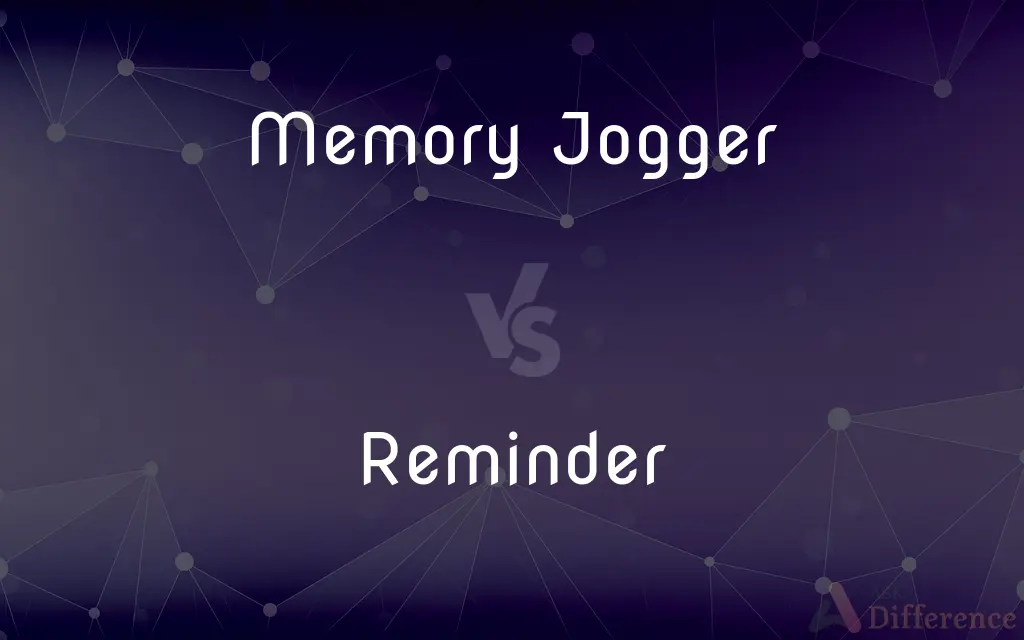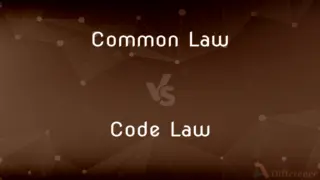Memory Jogger vs. Reminder — What's the Difference?
Edited by Tayyaba Rehman — By Fiza Rafique — Published on November 14, 2023
A Memory Jogger stimulates recall of information or experiences, while a Reminder serves as a prompt for a specific action or event.

Difference Between Memory Jogger and Reminder
Table of Contents
ADVERTISEMENT
Key Differences
A Memory Jogger is a term that often refers to tools, techniques, or triggers designed to aid the retrieval of specific memories or information. This could be a mnemonic device, a photo, or any cue that helps spark a memory. On the other hand, a Reminder is more direct and typically used to prompt an individual about a particular task, appointment, or event that they need to attend to.
The primary function of a Memory Jogger is to assist in recalling past events, facts, or experiences. It might not be tied to a specific future action. For instance, a Memory Jogger could be a song that takes you back to a past summer vacation. In contrast, a Reminder has a more forward-looking purpose. If you have a doctor's appointment next week, a Reminder would be set to ensure you remember to go.
The effectiveness of a Memory Jogger can be subjective, as what helps one individual recall a memory might not work for another. The cues in a Memory Jogger often tap into emotional, sensory, or cognitive aspects of memories. A Reminder, however, is usually more objective, serving as a clear and direct prompt, like an alert on a phone or a note on a calendar.
In essence, while a Memory Jogger aids in pulling information from the past into the present, a Reminder pushes the present towards a specific future action. They both deal with memory but in different capacities and with different objectives.
Comparison Chart
Purpose
Stimulate recall of past information or experiences
Prompt for a specific future action or event
ADVERTISEMENT
Direction
Reflects on the past
Looks towards the future
Subjectivity
Can be subjective (varies from person to person)
More objective (clear and direct prompts)
Associated Emotion
May evoke emotions or sensory experiences
Typically emotion-neutral
Usage
Mnemonics, nostalgic triggers, sensory cues
Alarms, notes, alerts, calendar entries
Compare with Definitions
Memory Jogger
An aid used to retrieve specific memories or information.
Using rhymes as a Memory Jogger can assist students in remembering facts.
Reminder
A prompt notifying someone of a future task or event.
I set a Reminder to pay the bills tomorrow.
Memory Jogger
A tool or trigger helping in recalling past experiences.
The scent of that perfume was a Memory Jogger, taking her back to her high school days.
Reminder
An alert or message to recall a specific action.
The buzzing of my phone served as a Reminder to take my medication.
Memory Jogger
A cue that stimulates the remembrance of a past event.
Seeing that old movie poster was a Memory Jogger for our first date.
Reminder
An instrument ensuring a person doesn't forget a particular duty or appointment.
The calendar had a Reminder for her dentist's appointment next week.
Memory Jogger
Something that helps bring forgotten information to the forefront.
The reunion acted as a Memory Jogger, bringing back myriad college memories.
Reminder
A note or signal indicating something that needs to be done.
The post-it on the fridge was a Reminder to buy milk.
Memory Jogger
An item or technique that evokes past memories.
For many, certain songs act as a Memory Jogger, reminding them of important life events.
Reminder
A tool to keep one on track with tasks or responsibilities.
Every morning, she received a Reminder to meditate for ten minutes.
Reminder
To cause to remember; put in mind
Must remind him to call.
Reminded her of college days.
Reminder
Someone or something that reminds.
He left a note as a reminder to get groceries.
Reminder
(finance) Writing that reminds of open payments.
She ignored first the reminder of 80 cents. At the end, she was sentenced to pay 200 euros!
Reminder
One who, or that which, reminds; that which serves to awaken remembrance.
Reminder
A message that helps you remember something;
He ignored his wife's reminders
Reminder
An experience that causes you to remember something
Reminder
Someone who gives a warning so that a mistake can be avoided
Common Curiosities
How is it used?
It's used to trigger recollections or to assist in the retrieval of information from one's memory.
What is a Memory Jogger?
A Memory Jogger is a tool or prompt that aids in recalling information or tasks that might otherwise be forgotten.
Do Memory Joggers work for everyone?
While they can be widely effective, individual effectiveness can vary based on personal experiences and cognitive patterns.
What is a Reminder?
A Reminder is a prompt or alert designed to notify or inform someone about a task, event, or important date.
How is a Reminder different from a Memory Jogger?
While both aid in recall, a Reminder is more about notification, whereas a Memory Jogger is about aiding memory retrieval.
Is a Memory Jogger always a physical object?
No, it can be a phrase, a mnemonic, an image, or any other cue that stimulates memory.
What's the psychology behind a Memory Jogger?
Memory Joggers work by leveraging the associative nature of memory. By connecting new information to familiar concepts or items, it becomes easier to recall.
Are Memory Joggers used in education?
Yes, they're often used to help students recall complex information.
Can songs or smells be Memory Joggers?
Absolutely! Songs, smells, and even tastes can evoke powerful memories from the past.
How can one create a Memory Jogger?
By identifying a familiar cue or anchor and associating it with the information you want to remember.
Is a Memory Jogger the same as a mnemonic?
While both aid in recall, a mnemonic is a specific kind of Memory Jogger designed as a pattern or rhyme to assist in memorizing information.
Can Reminders be digital?
Yes, many people use digital reminders on smartphones, computers, or other electronic devices.
Why are they effective?
They tap into the brain's associative recall mechanism, linking the familiar with the unfamiliar.
What are common forms of Reminders?
They can be alarms, sticky notes, calendar alerts, or even someone verbally reminding you.
How can Reminders be effective in daily life?
They help in organizing tasks, ensuring punctuality, and reducing the chances of forgetting important commitments.
Share Your Discovery

Previous Comparison
PHP vs. MySQL
Next Comparison
Common Law vs. Code LawAuthor Spotlight
Written by
Fiza RafiqueFiza Rafique is a skilled content writer at AskDifference.com, where she meticulously refines and enhances written pieces. Drawing from her vast editorial expertise, Fiza ensures clarity, accuracy, and precision in every article. Passionate about language, she continually seeks to elevate the quality of content for readers worldwide.
Edited by
Tayyaba RehmanTayyaba Rehman is a distinguished writer, currently serving as a primary contributor to askdifference.com. As a researcher in semantics and etymology, Tayyaba's passion for the complexity of languages and their distinctions has found a perfect home on the platform. Tayyaba delves into the intricacies of language, distinguishing between commonly confused words and phrases, thereby providing clarity for readers worldwide.












































